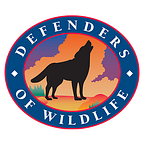Wildlife and the Farm Bill
The Farm Bill is among our most important federal policies for wildlife conservation. This expansive legislation governs many aspects of our nation’s production of food and fiber, from farm income and crop insurance to nutrition programs, rural development and much more. But Farm Bill programs are also essential for wildlife that depend on private land. The Farm Bill is up for renewal, and Defenders of Wildlife is working with Congress to ensure that the bill’s working lands and agricultural support programs also provide for productive wildlife habitat on private land.
What does farming have to do with wildlife?
Nearly 70 percent of the land in the lower 48 is privately owned, with more than 40 percent of that managed for agriculture. These diverse landscapes support thousands of species of conservation concern. In fact, private lands support more than 70 percent of the species listed under the Endangered Species Act with ten percent of listed species occurring only on private lands. These lands also disproportionately contain remaining tall and shortgrass prairie, longleaf pine forests, and bottomland hardwood forests — and the wildlife that depend on these ecosystems.
The Farm Bill offers voluntary programs for landowners to create, preserve and restore wildlife habitat on their pasture, cropland or forest land; to remove lands from production to help reduce runoff and erosion into streams; and to rebuild soil quality to benefit both agriculture and habitat. Landowners work with the U.S. Department of Agriculture and partners like Defenders to implement these programs. This work benefits an astounding array of flora and fauna, from hellbenders to sage grouse to monarch butterflies to the hundreds of migratory species that depend on private lands for breeding, nesting and wintering habitat. The participation of private landowners in Farm Bill conservation programs is critical to the long-term conservation and recovery of wildlife nationwide.
The 2018 Farm Bill
Approximately every five years, Congress reauthorizes the Farm Bill to update policy and establish initial funding levels for Farm Bill programs. The current 2014 Farm Bill is set to expire on September 30, 2018. The Congressional Budget Office estimates spending on Farm Bill conservation programs will total $58 billion over fiscal years 2014–2023.
Defenders is advocating for strong conservation programs in the 2018 Farm Bill that support long-term conservation and resiliency of habitat against climate change and other threats, and ensure landowners undertake a basic level of soil and wetland conservation on vulnerable lands in exchange for federal crop insurance subsidies. Last week we released our recommendations for the 2018 legislation. Grounded in years of experience in the field and our expertise in wildlife conservation policy, our recommendations are focused on strengthening the administration, implementation and accountability of conservation programs.
Defenders top five recommendations for the farm bill are:
- Prioritizing conservation of at-risk species in appropriate Farm Bill programs, including federally listed species and “Species of Greatest Conservation Need” identified in State Wildlife Action Plans.
- Supporting wildlife coexistence in working lands programs to conserve and recover apex predators such as wolves, bears and Florida panthers.
- Ensuring that federal agencies assess and evaluate Farm Bill conservation programs for wildlife outcomes.
- Maintaining or increasing support for Conservation Technical Assistance to improve efficiency and effectiveness of conservation program administration and implementation.
- Encouraging federal agencies to prioritize habitat connectivity in implementing Farm Bill conservation programs.
The current legislative process is also an opportunity to resolve problems with the Farm Bill. For example, some conservation funding is currently being diverted to less environmentally beneficial practices by larger industrial operations. A legislative fix has been proposed to address this issue. Defenders is also working to ensure that Congress does not attach unrelated policy riders to the Farm Bill that undermine or eliminate federal conservation law or impair management of federal public lands.
Conservation on private lands faces significant challenges, but through strong Farm Bill programs and support, we can provide habitat for wildlife while keeping working lands working.
Follow us on Twitter, Facebook and Medium to hear the latest from our experts and sign up for our emails to take action and join us in our fight to protect wildlife.
